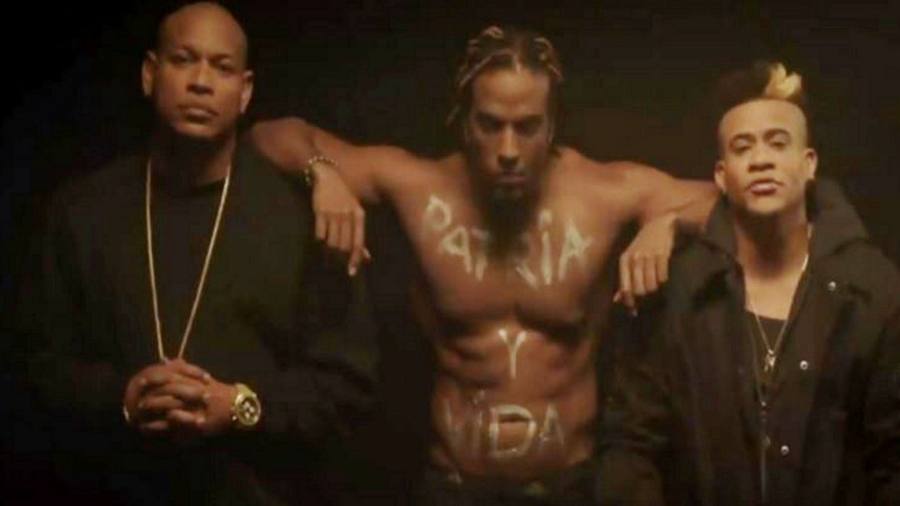[ad_1]
It is one of communist Cuba’s most hallowed slogans, deployed by Fidel Castro in the 1959 revolution and repeated countless times since: “Patria o Muerte†— Fatherland or Death.
So when a group of Cuban rappers, some living abroad, launched a lyrical challenge to the sacred phrase, subverting it to “Patria y Vida†— Fatherland and Life — and calling time on the revolution to a chorus of “It’s overâ€, the Havana government mobilised to defeat the insurgents, including with their own musical riposte.
The rap pulls no punches. The video opens with an image of 19th century Cuban hero José Martà that burns away to reveal George Washington, another revolutionary. “No more lies, my people demand freedom, no more doctrines,†run the lyrics.Â
“‘Fatherland and Life’ is a phrase of light, a phrase of rebirth,†Yotuel Romero, one of the rappers, told the Financial Times from Spain, where he spends part of his time. “Cubans who live abroad and those on the island have found hope in these words, hope for a prosperous Cuba . . . where we can live with our rights respected.â€
“The song has definitely caused quite a stir,†said Ricardo Herrera, director of the Washington-based Cuba Study Group, which promotes US-Cuba dialogue. “It’s a very potent song with lyrics that have resonated with a lot of Cubans, particularly outside the island.â€
Most of the musicians involved — Alexander Delgado and Randy Malcom from the reggaeton band Gente de Zona, singer-composer Descemer Bueno, as well as Yotuel — are Cuban exiles who until recently were regular visitors to Havana.
Two dissident rappers living on the island, El Funky and Maykel Osorbo, members of the San Isidro artistic collective, also feature. In November, San Isidro and its supporters gathered outside Cuba’s culture ministry to lead a rare public protest on the island after one of its members was imprisoned.
The rap furore comes at a sensitive time for Cuba’s communist government, which is struggling with serious food shortages and long queues for basic supplies. Pandemic restrictions and a tightening of the US embargo under the Trump administration have devastated tourism, an important source of dollars, and crimped the flow of remittances from overseas.
Official Cuban media were quick to blast the rappers as US-loving traitors and mercenaries. President Miguel DÃaz-Canel joined the attacks, tweeting: “#FatherlandorDeath shouted thousands last night . . . They tried to erase our slogan but Cuba has sent it viral #CubaVivaâ€.Â

This week, the authorities unveiled a musical counterblast: the rather awkwardly titled “Patria o Muerte por la Vida†— Fatherland or Death for Life — featuring five officially sanctioned performers, led by songwriter Raúl Torres, singing a robust salsa rebuttal to the rappers against the backdrop of a Cuban flag.
“You can cash in by licking the arrogance of the empire,†go the lyrics, referring to the US. “You can cash in by singing that you’re against poverty from a satin sofa.â€
So far, YouTube users seem to be siding with the rappers, who had almost 3m views as of March 5 compared with 670,000 for the regime-sanctioned retort.
Politicians abroad have weighed in too. Dita Charanzová, a Czech conservative in the European parliament, organised an internet seminar to support the rappers.
“Being Czech, the fight of Cubans for democracy reminds me a lot of our fight . . . against the communist regime,†she said. “Music and art played a fundamental part in the resistance.â€
The increasingly bitter musical war reflects a move by a new generation of Trump-supporting Cuban-Americans in Miami such as Alex Otaola, a social media influencer and internet TV host. He has sought to ban from Miami Cuban or Cuban-American cultural figures interested in improving relations between the two countries, preferring a hardline boycott policy.
“Latin music is becoming ever more popular and Miami is at the centre,†said a western Cuban music promoter who asked not to be named. “At the same time there is this new and even more hostile atmosphere toward any reconciliation there with Cuba that is very hard to escape,†he said.
It is unclear whether the musical battle will resonate with ordinary Cubans, most of whom are preoccupied with a daily struggle to find food and basic goods.
Several who spoke to the FT by telephone said they knew of the issue due to the government response, but added that most people were staying at home to avoid coronavirus and there was little talk about it in food queues.
Yurislaidis Lopez, a 32-year-old living in Marianao, a working-class suburb outside Havana, was unmoved by the video and its anti-authority message. “I’m not sure what they do to other people, but in my neighbourhood the police keep us safe,†she said.
“What everyone is talking about where I live is that for the first time in years the man on a bike with a box of piglets on the back hasn’t arrived. We raise them for the new year.â€
[ad_2]
Source link






